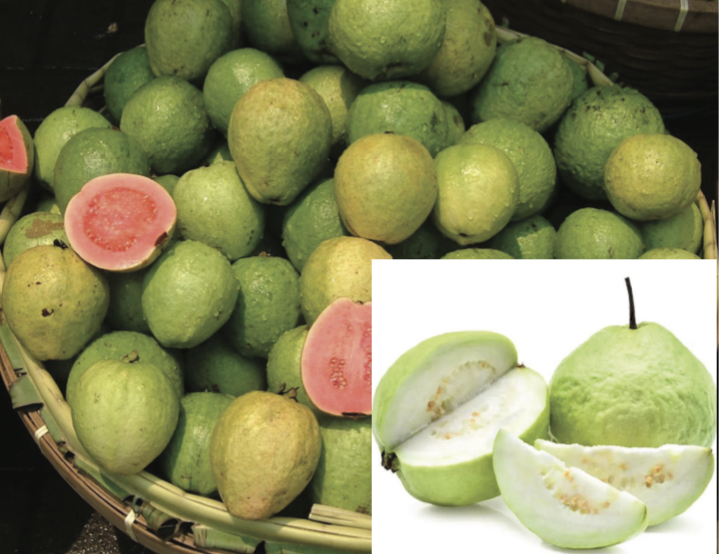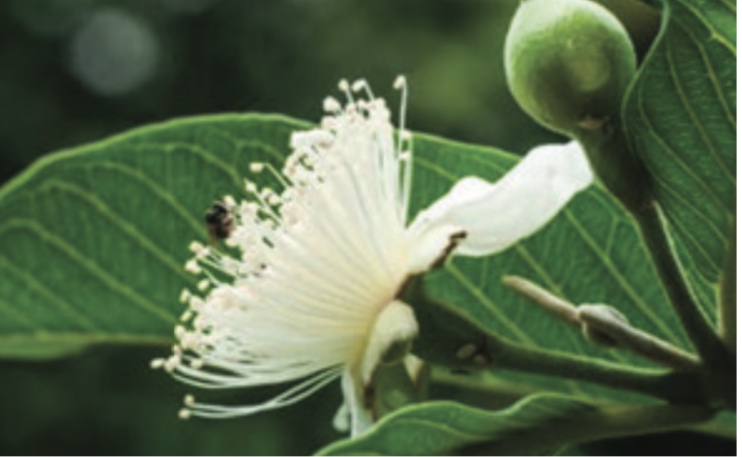FOOD AS MEDICINE GUAVA;The Complete Medicinal Plant

Common Guava, Psidium guajava, is a tropical tree with edible fruits that grows both
in the tropical and subtropical regions worldwide though it is said to be native to
Central America (Mexico) and the Caribbean. The tree also grows freely here in
Nigeria and can grow to between twelve and twenty feet depending on the specie or
where planted. The bark is usually greenish brown, smooth but sometimes appears in
tiny flakes and the leaves are oval-shaped, grow in twos while the flowers are white,
presenting multiple central stamens that look like water fountain or fireworks.
The oblong -to- oval fruit is fleshy with very densely seedy pulp that come in variety
of colours like white, pink and at times outright red when ripened. For some species,
even when matured, the fruit still appears greenish, but the musky pungent smell
gives away its readiness for consumption from afar. Guava can be enjoyed as fruity
snacks and desserts, and because of the high pectin content can easily be processed
into jams, jellies, candies and common pastry fillings because of the high pectin
content.
Some cultures enjoy the raw fruit cut in quarters like apple and eaten with a pinch of
salt, cayenne pepper or some spicey mix, while some other places like Mexico and
other Latin American countries, make their popular beverage agua fresca , with
guava and the a key ingredient in punch, the juice often used in culinary sauces is
also guava. Red Guava can also be used as the base of salted products substituting for
tomatoes. Some climes make a drink from an infusion of guava fruits and leaves,
which in Brazil is called chá-de-goiabeira, guava tea considered highly medicinal.
Generally, the fruit is said to be a super age reversing fruit because of its very high
vitamin c content which is claimed to be double the amount found in Oranges and
broccoli.
The whole of the tree, ranging from the leaves, the fruit to the bark and roots are
health beneficial and according to Drugs.com, independent medicine information
website, “Guava bark has been used medically as an astringent and to treat diarrhea
in children, while the flowers have been used to treat bronchitis and eye sores and to
cool the body. The fruit has been used as a tonic and laxative and for treatment of
bleeding gums. The plant has been used in Africa and Asia to prevent and treat scurvy
and to treat hypertension in western Africa. Ethnomedicinal reports document use of
the plant in treating malaria. Scientific investigations of the medicinal properties of
guava leaf products date back to the 1940s.”
So, you see, the guava tree plant in your compound is not just another tree or for
snacks, but a complete God given remedy for hunger number of ailments. Due to the
preponderance of side effects resulting from the usage of conventional medicines and
drugs, herbal plants are being increasingly considered for the treatment of various
diseases and guava leaf is one of them. Because of its medicinal properties, guava
leaf supplements are nowadays available in the form of capsules and guava leaf tea.
You don’t have to wait to get sick before eating the fruit and making the leaves your
customized “Green Tea”, and use the tender branches as chewing stick. It is not
advisable to use the capsule or processed tea version if you can avail yourself of its
natural alternative
Martin Hajek , writing for Natural News blog, independent articles and opinion on
natural health, posits that, “People in Asian countries steep guava leaves in boiling
water and drink the extract as a folk remedy for diabetes. These leaves contain many
beneficial substances, including powerful antioxidants like vitamin C and flavonoids
such as quercetin. It contains a number of other Phytochemicals such as anthocyanins,
carotenoids (especially lycopene), essential oils, fatty acids, flavonoids, phenols,
lectins, tannins, saponins and triterpenes, and vitamins.”
He further states that,” Drinking a tea made by infusing guava leaves in boiling water
may be helpful in treating diarrhea, cold and flu, lowering cholesterol, preventing
diabetes, and it even exhibits anti-cancer properties”, and that, “Herbalists around
the world use this tea to treat everything from diabetes and digestive problems to
toothaches, acne, wrinkles, cough, inflammation, arthritis, gout but also to prevent
hair loss”. “Traditional medicine recommends drinking a cup of guava leaf tea daily to
develop protection against common colds and the flu”, he concludes.

Other health benefits derivable from the guava tree apart from the high ascorbic
content of the fleshy fruit include – aid in digestion, management of bronchitis,
prostate cancer, weight loss, menstrual pain and boosting sperm count to mention a
few. However, further research has shown that its anti-Viral and anti-bacterial
activities is very strong. Martin Hajek writes that, “a laboratory research published in
the issue of the Ethnopharmacology in 1999, proclaimed that extracts of dried guava
leave effectively restrained the growth of staphylococcus aureus: Staph A, a common
cause of skin infections, respiratory diseases, and food poisoning’’. He claims that
“about 90% of eczema victims are carrying Staph A on their skins and believes they
can benefit from guava leaf extra which is so great for skin problems as well.
Another study according to him also maintains that Guava leaves can be highly
beneficial to the cardiovascular system since the tea is said to help lower cholesterol
and triglycerides while keeping the good cholesterol in good balance. Hear him,
“Regular drinking of guava leaf tea might also improve your blood lipids. Several small
clinical studies reviewed in a 2010 paper in “Nutrition and Metabolism” say that guava
leaf extracts may improve blood cholesterol and unhealthy triglycerides in human
subjects. Study participants who drank guava leaf tea had lower total cholesterol,
low-density lipoprotein levels, and triglycerides after 8 weeks and their levels of
beneficial HDL were not affected. Other experimental studies insist that regular
drinking of guava leaf tea might also improve blood lipids; and smaller clinical studies
reviewed in a 2010 paper in, “Nutrition and Metabolism”, say that “guava leaf extract
may improve blood cholesterol and unhealthy triglycerides in human studies, study
participants who drank guava leaf tea had lower total cholesterol, lower density
lipoprotein levels and triglycerides”
Despite it being a super fruit, generally safe, and great addition to human health
regimen, it is still advisable to apply caution both in the consumption of the fruit and
use of the leaf extract. For instance, the fruit should not be eaten more than three a
day. There is also no need to overindulge in the drinking of the leaf tea, as one or two
teacups daily would still be ideal. Moderation and caution should be the watch words
and please don’t forget to talk to your doctor if you have any specific medical
condition.
